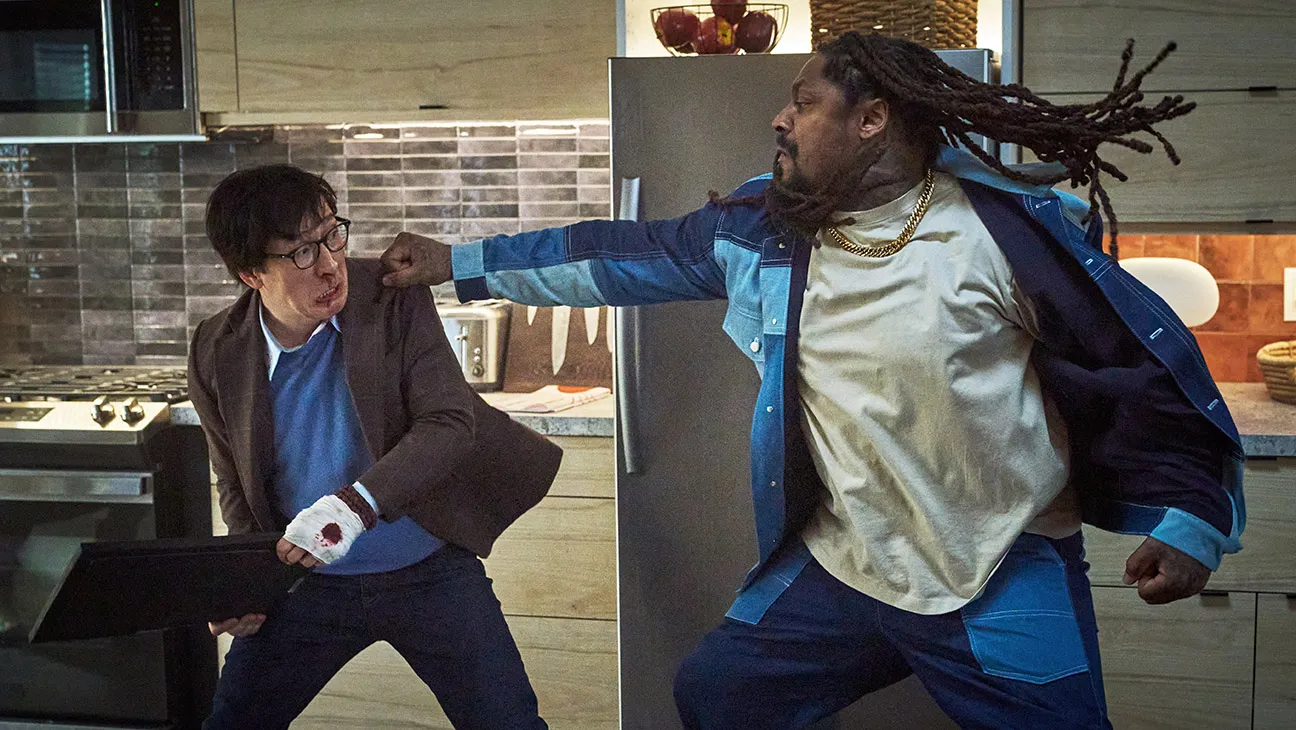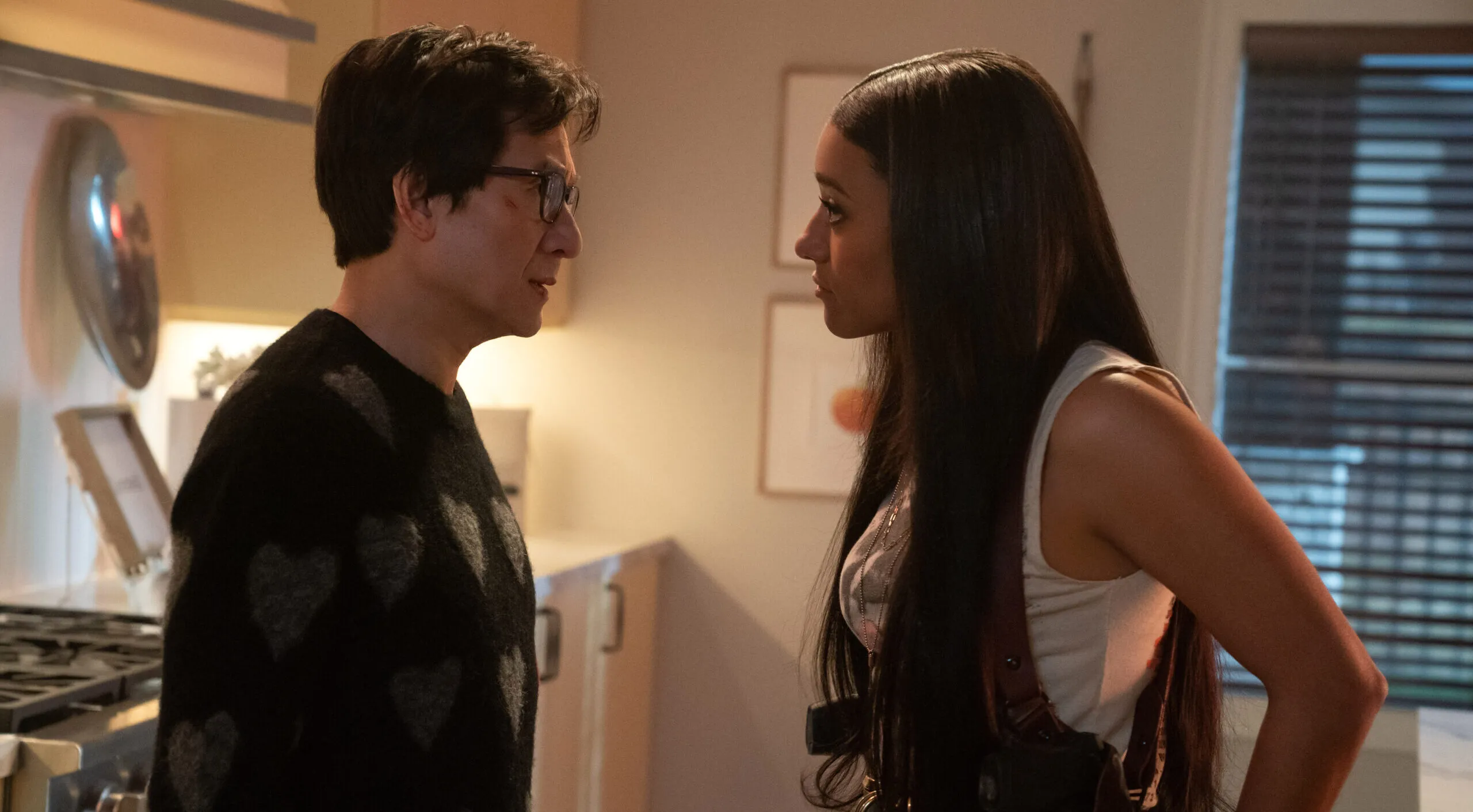“Love Hurts” offers an offbeat narrative that pairs a Valentine’s motif with brisk, hard-hitting action. The film introduces Marvin Gable—a man whose former career in covert violence now sits incongruously behind a desk in a modest real estate office. His transformation (which might remind one of a jaded actor switching roles mid-performance) hints at the societal obsession with reinvention and the price paid for escaping a violent past.
Set against the unassuming streets of Milwaukee, the film uses the city’s mundane suburban charm as a foil for buried transgressions. Here, everyday life carries an undercurrent of guilt and secrecy, reminiscent of historical moments when communities masked deeper, unresolved conflicts beneath a veneer of normality.
Marvin’s dual existence—a peaceful property consultant by day and a man haunted by memories of deadly assignments by night—serves as a metaphor for the masks individuals wear to hide inner turmoil.
The inciting moment arrives with a mysterious Valentine’s card from Rose, a figure from Marvin’s former life whose unexpected reappearance triggers a cascade of events. The card functions as a symbolic reminder that the past is never truly dormant, challenging Marvin to reconcile his newfound identity with the lingering shadows of his former deeds (and offering a wry nod to fate’s peculiar sense of humor).
Machinations of Memory and Might
Marvin’s existence as a successful real estate agent in Milwaukee is a facade that conceals a violent, secret past. The film sets the stage by revealing a man who manages property sales with a practiced smile while shadowed by memories of grim tasks and covert alliances.
His relationship with his crime lord brother, known simply as Knuckles, appears against this placid suburban calm, evoking echoes of eras when family loyalty meant survival amid organized turmoil. Equally, the reappearance of his former partner, Rose, provides a personal counterpoint to the criminal world he once inhabited (a choice that hints at the persistent pull of past lives).
The narrative’s pivot comes with a mysterious Valentine’s card—a symbol that rings like an old phone call from a forgotten era. This missive triggers a chain reaction, compelling Knuckles to issue a deadly mandate against both Marvin and Rose. The card acts as both literal and figurative spark, igniting conflicts that upend the quiet order of Marvin’s present and thrust him back into a world he assumed was left behind.
Structural devices pepper the film: flashbacks offer snapshots of a bygone life, while sporadic voiceovers attempt to map out the maze of personal history. Yet the method feels somewhat mechanical, with pacing that occasionally stumbles over inconsistencies (Rose’s true status turns into a perplexing question mark amid the unfolding drama). The narrative strives to balance a straightforward setup with the complications of tangled loyalties and lingering scores.
At moments, the storyline exhibits a brisk ambition that clashes with its own simplicity. In certain sequences, events mimic historical shifts, where a single missive or command redraws power dynamics overnight. This fusion of personal memory and sudden violence remains an arresting, if uneven, narrative experiment.
A peculiar “narrative oscillation” emerges when clarity is momentarily sacrificed for dramatic flair, leaving some scenes as enigmatic puzzles rather than straightforward spectacles. Such moments invite reflection on how personal history intertwines with abrupt societal shifts, reminiscent of significant historical turning points.
Faces in the Mirror: Character Complexity and Portrayals
Marvin Gable stands as a curious study in contradictions—a friendly real estate professional by day who harbors a violent past that refuses to fade quietly into memory. Ke Huy Quan imbues Marvin with a wry charm and a subtle physicality, his every gesture hinting at a life of covert conflicts.
One can almost see echoes of historical figures who wore multiple masks in tumultuous times (a performance choice that sparks both admiration and a raised eyebrow).
Rose enters as a figure from a bygone, dangerous chapter—a former partner whose reappearance stokes Marvin’s buried conflicts. Her portrayal carries the weight of an old debt, yet her interactions with Marvin vacillate between sparks of genuine connection and moments that feel as if they were sketched hastily (a point that may leave viewers scratching their heads). The chemistry here oscillates unpredictably, suggesting that the intended magnetic pull sometimes falls short of full realization.
Knuckles, embodied by Daniel Wu, casts a long and unyielding shadow over the proceedings. His presence recalls the stern, unbending leaders of historical power struggles, whose authority was both revered and feared.
The supporting figures—a collection of menacing yet occasionally tongue-in-cheek adversaries such as The Raven and the ensemble featuring Marshawn Lynch, André Eriksen, and Cam Gigandet—inject moments of unexpected humor into the narrative. Their performances create a collage of menace and levity, each contributing a distinct note to the film’s cacophonous score.
A side narrative featuring Marvin’s assistant, Ashley, occasionally offers brief respite, punctuating the tension with dry quips and understated moments that momentarily lighten the mood. Other fleeting character sketches—be they the officious boss or cameo appearances that flash by—provide curious glimpses into a wider cast that collectively hints at modern myth-making. Each character, with all their contradictions and fleeting brilliance, prompts one to reflect on how public facades and hidden truths often coexist in our own day-to-day dramas.
The Kinetic Drama: Action and Craft
Director Jonathan Eusebio leverages his extensive background in stunts to stage sequences that vibrate with raw physicality. The film’s choreography is a study in contrast—a display of meticulously orchestrated brawls where everyday settings transform into arenas of conflict.
Consider the kitchen fight: mundane utensils become unexpected weapons, and the familiarity of a homely space turns into a stage for kinetic mayhem. Similarly, the office skirmish uses its sterile backdrop to underscore the irony of past transgressions invading the present.
The camera experiments with unconventional perspectives. One scene, captured from inside a refrigerator, offers a disconcerting and almost intimate glimpse of the chaos. These inventive visual choices can either sharpen the impact of each punch or pull the viewer’s focus away from the central narrative (a choice that has its supporters and detractors). The visual angles create what might be termed a “framed disorientation,” challenging traditional approaches to action cinematography.
Sound effects and foley work function as an auditory counterpoint to the visual spectacle. Every collision and strike is punctuated by clattering metal and snapping wood, a design choice that magnifies the sensory experience. Yet, there are moments when the cacophony overshadows the subtle storytelling cues embedded in the background, hinting at an imbalance between spectacle and substance.
Action here is not a mere visual interlude but a narrative engine. The sequences intersperse humor with violence in a manner that mirrors real-life unpredictability—light-hearted banter colliding with bursts of brutality. This interplay of moods may leave some viewers amused and others perplexed, as the scenes oscillate between meticulously choreographed routines and unrestrained physical frenzies. There is a deliberate nod to historical instances when sudden outbreaks of violence disrupted mundane existence, prompting reflection on how unexpected events reshape everyday life.
Framed Realities: The Art of Visual Storytelling
The film situates its narrative in a landscape that is as calculated as it is ironic. Milwaukee’s unassuming suburbs become a stage where sterile real estate offices and contrived lairs contrast sharply (one might think of them as modern-day stages for secret dramas).
The settings seem chosen to evoke an awareness of how everyday environments can harbor hidden histories and unforeseen tensions—a reminder that even the most ordinary streets can conceal stories of transformation and past misdeeds.
Lighting and framing here are employed with deliberate exactness. Scenes are bathed in a clinical glow that both flatters and exposes; moments of levity punctuate the intensity, much like a well-timed wink in an otherwise somber portrait. The director’s use of practical stunts is captured with a clarity that renders each confrontation almost balletic. Visual effects serve the narrative rather than dominate it, presenting action sequences as carefully composed vignettes rather than chaotic outbursts.
Costume choices contribute their own subtle commentary. Marvin’s heart-themed sweater, for instance, is not merely a quirky nod to a holiday motif—it stands as an emblem of his internal struggle between his past and his present.
Props and set dressing are meticulously arranged, reinforcing themes of duality and the tension between outward normalcy and inner conflict (a quiet nod to historical moments when appearances deceived as much as they revealed). Each visual element collaborates to craft a world that is at once familiar and unsettling, provoking a reconsideration of how our environments shape and reflect our identities.
Hearts Under Fire: Themes, Tone, and Genre Fusion
Fundamentally, the film examines the challenge of reconciling a tranquil suburban existence with a violent past. Marvin Gable embodies this paradox—a diligent real estate agent whose hidden history of lethal precision continually disrupts his current calm.
His struggle becomes a subtle commentary on societal pressures to maintain a polished facade while secret burdens persist beneath (a phenomenon not unfamiliar in times of political or social upheaval).
The Valentine’s Day setting infuses the narrative with a peculiar duality. A holiday associated with tender sentiment is repurposed as a harbinger of retribution and unresolved debts.
The triggering Valentine’s card is more than a mere plot device; it symbolizes an unavoidable summons from a former self, stirring tensions that echo historical moments when celebrations masked turbulent realities. In this way, the film casts the holiday in an unexpected, almost subversive light.
The interplay between slapstick humor and meticulously choreographed violence generates a tonal tug-of-war throughout the film. Brief moments of levity—quirky exchanges or absurd visual gags—intersect with sequences of raw brutality. This collision of moods provokes a complex viewer response; sometimes, the humor softens the blow of the violence, while at other times, the contrast jarred the senses in a way that feels both refreshingly candid and somewhat disjointed.
Underlying these dynamic elements are themes of redemption and personal transformation. The dialogue, occasionally bordering on the poetic (and at times sounding like spontaneous musings), attempts to articulate the consequences of past choices.
Character motivations are communicated through subtle narrative cues, inviting audiences to consider how individuals negotiate the weight of their histories. This layered thematic structure offers a reflective lens on modern identity, prompting a reconsideration of how personal evolution intersects with societal expectations and historical legacies.
Heated Aftermath: Final Reflections and Genre Impact
The film aims to combine tender romantic moments with brisk, stylized combat. Marvin’s predicament—a man caught between the tranquility of suburban life and the harsh memories of his past—echoes scenarios seen in significant historical upheavals, where personal reinvention often comes at a steep cost.
This approach to marrying domestic sentiment with visceral action creates a curious case study in modern storytelling. At times, the mix feels awkward—as if two worlds, each with its own language, have been forced into a single narrative. Still, the attempt itself raises questions about our cultural fascination with reinvention and the price of change.
Inventive stunt work and unexpected bursts of genuine charm stand out as high points. Certain sequences, executed with an offbeat precision, spark the imagination and invite comparisons to the energetic set pieces of bygone action classics. Yet, there are moments when the characters remain mere outlines, their inner lives sketched in broad strokes rather than refined details. Such gaps remind one of historical episodes when revolutions were launched with great flair but left little time for introspection.
The shift of a seasoned stunt professional into a directorial role signals a possible trend: a fresh wave of projects where physical storytelling is paramount. The director’s choices—sharp editing, unconventional visual angles—may well set the stage for future experiments in action-comedy. The film’s mark on the current cinematic scene, then, becomes a conversation starter about the evolving balance between entertainment and narrative depth.
The Review
Love Hurts
Love Hurts is a film that merges everyday suburbanity with unexpected, explosive action. Its daring stunt sequences and vivid visuals provide moments of genuine delight, even as the mix of humor and violence creates an uneven rhythm. Marvin’s internal conflict offers a glimpse into modern struggles between public persona and hidden pasts, though the narrative occasionally stumbles in its execution. The movie sparks conversation about the cost of reinvention and the lure of spectacle. Rating: 6/10
PROS
- Inventive stunt choreography
- Vivid visuals and creative camera work
CONS
- Pacing issues in the narrative
- Inconsistent tone between action and comedy
- Underdeveloped secondary characters
- Noticeable plot holes in backstories
- Missed opportunities for deeper character exploration





















































